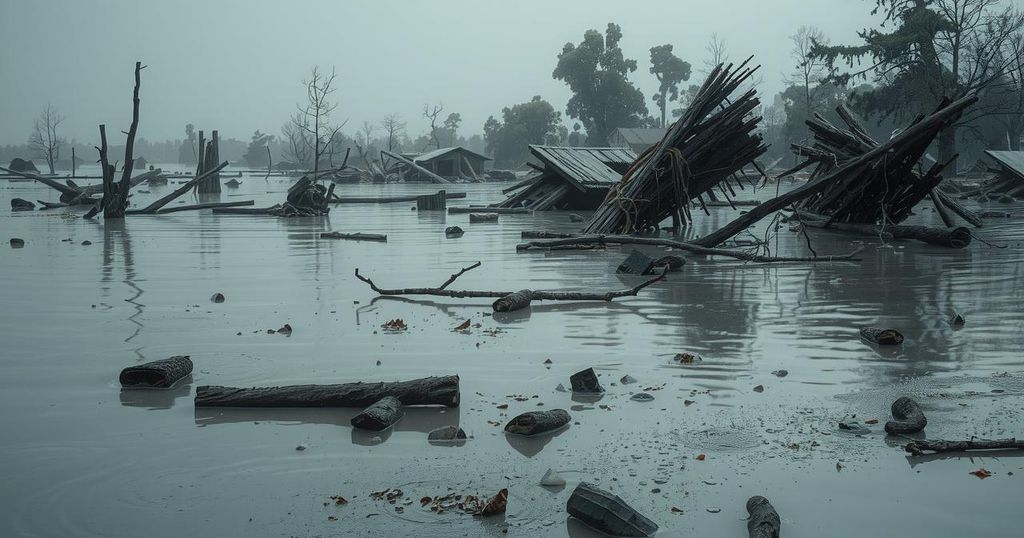Mokwa Residents Confront Hazardous Odor Following Deadly Floods
Residents of Mokwa, Niger State, struggle with the aftermath of recent flooding, including the overwhelming smell from decaying corpses. With hundreds displaced and fatalities confirmed, urgent government intervention is underway. Both Federal and local authorities have pledged funds for recovery efforts, but concerns regarding health and safety remain paramount as communities call for increased action.
The tragedy that befell Mokwa Local Government Area of Niger State continues to haunt its residents, nearly two weeks after severe flooding led to extensive loss of life and property. The ongoing flow of putrid odors from decaying corpses, believed to be flood victims still entombed beneath debris, has provoked growing health concerns among the community. Residents described the stench as a constant, painful reminder of the disaster, compounding the trauma experienced during the floods.
On May 28 and 29, Mokwa experienced catastrophic flooding, believed to have claimed the lives of around 200 individuals. Official reports from the Niger State Emergency Management Agency confirm that at least 161 bodies were recovered, while more remain buried in various locations across the devastated area. In total, approximately 3,000 residents were displaced, and over 50 homes were lost to the torrents.
Local resident Esther Nwanosike shared her distress about the odors emanating from undisturbed corpses as she serves food from her makeshift shop. “The smell is overwhelming, and I am concerned about the potential health implications. My customers complain they can hardly breathe,” she said. She urged government officials to take immediate action, including fumigating the area to alleviate the horrid smells.
Another inhabitant, Alhassan Kolo, noted that some of the corpses have become unrecognizable due to decomposition. “Honestly, you can’t even recognize them as they decay. We are digging through sand and occasionally coming across both property and bodies,” said Kolo, who is deeply troubled by the continued presence of corpses.
Ahmed Yusuf lamented the implications of the pervasive stench, stating, “I believe it’s from corpses yet to be found. It’s choking us. The government must act quickly to manage this situation.” Salihu Ishaq echoed his sentiments, recalling horrors from the flood and expressing concern that many individuals are still missing. “Women, men, and children died. The government must work swiftly to recover these bodies, or we can’t live in this area due to the smell,” he remarked.
Residents are also experiencing challenges in temporary shelters, as many displaced individuals are reluctant to remain in camps set up by the government. Those who lost family members, like Amina Abubakar, anxiously search for loved ones and implore the government for assistance. Abubakar said, “We are still searching for children. They may be dead by now. Many have lost everything and urgently need help.”
Responding to the crisis, the Federal Government has committed N2 billion for recovery efforts, accompanied by essential supplies of food and materials. Similarly, the Niger State government announced a donation of N1 billion to aid in rehabilitation, but community leaders remain anxious about the ongoing situation.
Idris Ibrahim, Director of Public Health, confirmed the government’s awareness of the situation and stated that a control team is actively addressing the issue of the stench. He assured that local officials are working tirelessly to manage the predicament.
A representative from the Niger State Emergency Management Agency shared that recovery and rehabilitation efforts are ongoing, highlighting the contributions made by various levels of government and community volunteers. Director General Abdullahi Baba-Arah confirmed the current death toll stands at 161.
Manzo Ezekiel from the National Emergency Management Agency emphasized the collaborative response to the disaster but clarified that the foul odor arises not solely from dead bodies. “This residential area has waste issues as well, which were exacerbated by the flooding. It’s a mix of decaying bodies and exposed sanitation facilities,” he explained.
Governor Mohammed Bago weighed in on the flooding’s cause, speculating that some water may have originated from neighboring countries. The disastrous flooding led to a promise of relocation initiatives, as the Governor called for improved mechanisms for managing climate change. During the visit of Borno State Governor Babagana Zulum, who announced a N300 million donation as well, concerns surrounding the impact of climatic changes were emphasized.
The ongoing suffering of Mokwa’s residents underscores the urgent need for decisive action from government authorities to address the aftermath of catastrophic flooding. The overwhelming stench from decaying corpses serves as a continual reminder of the tragedy. While the government has pledged financial assistance and resources to aid recovery, the community continues to confront significant health hazards and trauma. Enhancing coordination efforts and addressing immediate needs remains critical as recovery efforts progress.
Original Source: punchng.com




Post Comment